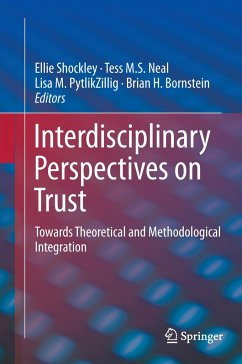This timely collection explores trust research from many angles while ably demonstrating the potential of cross-discipline collaboration to deepen our understanding of institutional trust. Citing, among other things, current breakdowns of trust in prominent institutions, the book identifies common aspects of trust as well as domain- and context-specific variations deserving further study. Contributors analyze similarities and differences in trust across public domains from politics and policing to medicine and science, and across languages and nations. Innovative strategies for measuring and assessing trust also shed new light on this important human behavior.
Highlights of the coverage:
- Consensus on conceptualizations and definitions of trust: are we there yet?
- Differentiating between trust and legitimacy in public attitudes towards legal authority.
- Examining the relationship between interpersonal and institutional trust in political and health care contexts.
- Trust as a multilevel phenomenon across contexts.
- Institutional trust across cultures.
- The "dark side" of institutional trust.
With its stimulating array of concepts and applications, Interdisciplinary Perspectives on Trust will attract a varied audience, among them experts in political science, criminal justice, psychology, law, economics, healthcare, sociology, public administration, cross-cultural studies, and business administration.
Highlights of the coverage:
- Consensus on conceptualizations and definitions of trust: are we there yet?
- Differentiating between trust and legitimacy in public attitudes towards legal authority.
- Examining the relationship between interpersonal and institutional trust in political and health care contexts.
- Trust as a multilevel phenomenon across contexts.
- Institutional trust across cultures.
- The "dark side" of institutional trust.
With its stimulating array of concepts and applications, Interdisciplinary Perspectives on Trust will attract a varied audience, among them experts in political science, criminal justice, psychology, law, economics, healthcare, sociology, public administration, cross-cultural studies, and business administration.








